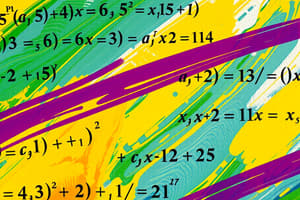Podcast
Questions and Answers
Match the following algebraic terms with their descriptions:
Match the following algebraic terms with their descriptions:
Variable = A symbol representing a quantity that can vary or change Constant term = A number in an algebraic expression that does not change Isolating the variable = The process of getting the variable alone on one side of the equation Substituting the value = Replacing the variable with a specific value and evaluating the expression
Match the following steps in solving algebraic equations with their descriptions:
Match the following steps in solving algebraic equations with their descriptions:
Isolating the variable = The process of performing operations to get the variable alone on one side of the equation Verifying the solution = Substituting the value obtained back into the original equation to check if it satisfies the equation Performing operations = Carrying out addition, subtraction, multiplication, or division to simplify the equation Checking the solution = Ensuring that the obtained value for the variable satisfies the given equation
Match the following fields with their applications of algebra:
Match the following fields with their applications of algebra:
Engineering = Designing and analyzing structures, systems, and processes using algebraic models Science = Using algebra to model and analyze complex natural phenomena and scientific theories Medicine = Applying algebra to calculate dosages, predict drug interactions, and analyze medical data Business = Utilizing algebra for financial analysis, optimization of processes, and decision-making in commercial settings
Match the following characteristics with their role in algebra:
Match the following characteristics with their role in algebra:
Flashcards are hidden until you start studying
Study Notes
Maths: The Basics of Quantitative Reasoning
Maths, short for mathematics, is a fundamental discipline that deals with the study of numbers, quantities, structures, and their relationships. It has various branches, each with its own set of concepts and applications. One of the most essential branches of maths is algebra, which focuses on the manipulation of symbols and the application of rules to solve equations and problems.
Algebra: The Art of Solving Equations
Algebra is a branch of maths that deals with the manipulation of symbols, numbers, and expressions to solve problems. It involves the use of letters (often x, y, z) to represent unknown quantities, and operations such as addition, subtraction, multiplication, and division. The goal of algebra is to find the value of the unknown quantities by setting up and solving equations.
Algebraic Equations
An algebraic equation is a mathematical statement that expresses the equality of two expressions involving one or more variables. The variables in an algebraic equation are represented by letters, and the equations are used to solve for the values of these variables. For example, the equation x + 5 = 10 can be solved to find the value of x, which in this case is 5.
Algebraic Expressions
Algebraic expressions are mathematical formulas that use symbols and operations to represent relationships between numbers. They can be used to solve problems, calculate values, and make predictions. For example, the expression 2x + 5 is an algebraic expression where x is the variable and +5 is the constant term.
Solving Algebraic Equations
Solving algebraic equations involves several steps, including isolating the variable, performing operations, and checking the solution. For example, to solve the equation x + 5 = 10, you would first isolate the x term by subtracting 5 from both sides, resulting in x = -5. To verify the solution, you would substitute the value of x back into the original equation.
Applications of Algebra
Algebra has numerous applications in various fields, including engineering, science, medicine, and business. It is used to model and analyze complex systems, optimize processes, and make informed decisions. For example, in engineering, algebra is used to design and analyze structures, while in medicine, it is used to calculate dosages and predict drug interactions.
In conclusion, algebra is a powerful tool in maths that enables us to solve problems, understand relationships, and make predictions. It is a versatile discipline with many applications in various fields, making it an essential part of quantitative reasoning.
Studying That Suits You
Use AI to generate personalized quizzes and flashcards to suit your learning preferences.




